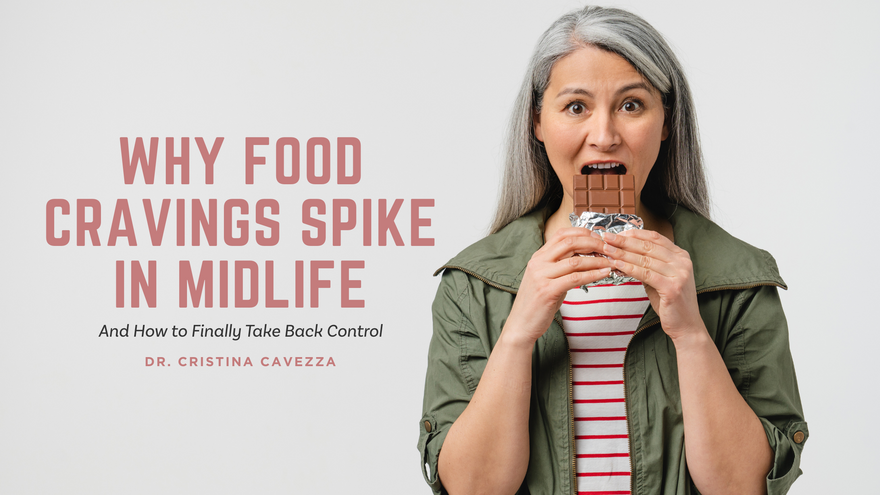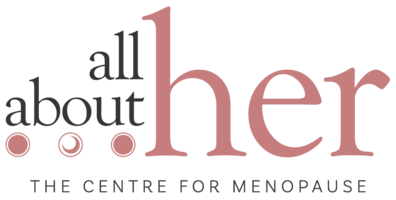
You swore you wouldn’t snack after dinner… and yet, here you are with a bag of chips in hand.
Sound familiar?
Food cravings in peri/post-menopause are incredibly common – and not a sign of failure or a lack of willpower. Understanding and managing food cravings can lead to major improvements in energy, emotional wellbeing, and overall health.
Why Food Cravings Spike in Midlife
Between the ages of 40 and 60, we see significant shifts in women’s lives. There can be changes in occupational or marital status, increased risk of health problems, loss of loved ones, and/or balancing caring for children or grandchildren as well as elderly parents. All these experiences can cause stress and fatigue. At the same time, you are experiencing biological changes. The menopausal transition involves dramatic variations in ovarian hormones, namely estrogen and progesterone. Research shows that ovarian hormone fluctuations and levels during the menopausal transition may also influence your eating habits and lead you to eat more. But there is lots of individual variability.
Two women of the same age with the same ovarian hormone levels and the same menopausal symptoms, will not necessarily both have difficulty with overeating. Those that overeat may be more sensitive to the hormone changes. What makes people more sensitive to hormone changes is not yet well understood but it may be due to other psychological factors, like the person’s ability to manage stress generally, their thoughts around food and their body, and the level of body shame or weight stigma they feel.
The Cost of Ignoring Food Cravings
When you try to battle cravings with willpower alone, you may see a restrict-binge cycle where you vacillate between periods of undereating or restricting certain foods to then overeating or binging on sugary, salty or fatty convenience foods. Overeating can lead to negative emotions, like guilt and shame, which can in turn lead you to seek comfort in food. While this might provide short-term relief, it can lead to a host of negative long-term consequences, including unwanted weight gain, irritability and fatigue. The restrict-binge cycle not only affects your physical health, but also your confidence, relationships and daily enjoyment.
The Benefits of Managing Food Cravings Effectively
A mindful eating approach that focuses less on restriction and more on nourishment has many benefits. It can lead to improved energy and mood, better hormonal balance and digestion, more confidence in your decision-making and body trust. It can also help you avoid turning to food to manage your emotions. In fact, when you are calmer and more in control generally, you will tend to make healthier choices in all aspects of your life. Unfortunately, most weight-loss and fitness programs focus on what to eat but not why you eat. When you learn the triggers that lead you to grab that piece of chocolate or whatever your favourite comfort food is, you can start implementing strategies to eat more mindfully.
How to Start
Eating regularly and not skipping meals is important to sustain energy and maintain a stable mood. However, in those risky moments when you are stressed, tired or upset, you may be more inclined to reach for something sugary, salty or fatty. Try this instead: Pause and ask yourself “Am I hungry, or do I need comfort?” This simple act of tuning inwards can help you reassess if your body is craving more than food. Remember the goal here is not to deprive yourself but rather to enrich yourself.
Where Can I Get More Help
If you are a woman in peri/post-menopause (roughly aged 35+) and you’d like help managing your eating habits, then you might be interested in working with me. I run an online group program for women like you who want to go from feeling bad about themselves and not in control, to confidently able to manage life’s many stressors without turning to food for comfort. If you want to learn from an expert who is body positive and has a feminist spirit, then I invite you to book a free, 15-minute consultation with me to see if my program is a good fit for you.
About the Author
Dr Cristina Cavezza is a clinical psychologist with a private practice in Melbourne, Australia. She is a busy perimenopausal mother of twins and understands firsthand the challenges with maintaining healthy eating habits while juggling career, family and one’s own health needs. She has over 15 years’ experience and provides one-to-one therapy in-person or via telehealth. She also runs the online group program for peri/post-menopausal women who want help managing their emotions better so that they are less likely to turn to food for comfort.

Comments